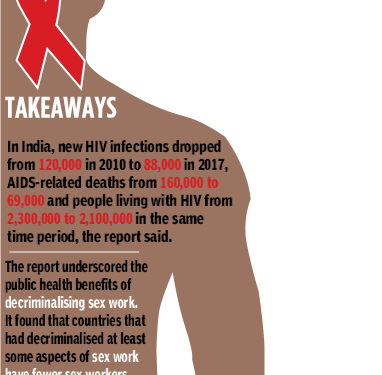United Nations: India saw a major reduction in the number of new HIV infections, AIDS-related deaths and people living with HIV from 2010 to 2017 on the back of sustained and focussed efforts, according to a UN report which warned that the epidemic was growing in Pakistan.
The Joint UN Agency on AIDS (UNAIDS) report titled ‘Miles to go closing gaps, breaking barriers, righting injustices’ said Asia and the Pacific regions have made strong inroads with its HIV response. Sustained and focused efforts to reach key populations have led to major reductions in HIV infections in Cambodia, India, Myanmar, Thailand and Vietnam between 2010 and 2017.
The report, however, warned that the global new HIV infections were not declining fast enough. It also noted that the epidemics were expanding in Pakistan and the Philippines.
In India, new HIV infections dropped from 120,000 in 2010 to 88,000 in 2017, AIDS-related deaths from 160,000 to 69,000 and people living with HIV from 2,300,000 to 2,100,000 in the same time period, the report said. India has an approved social protection strategy, policy or framework that is being implemented, it said.
Successive surveys in Cambodia, India, Thailand and Vietnam also indicate that attitudes towards people living with HIV have improved creating safer working conditions for sex workers and engaging them closely in the design and implementation of programmes make a huge difference, it said.The report underscored the public health benefits of decriminalising sex work.
It found that countries that had decriminalised at least some aspects of sex work have fewer sex workers living with HIV than countries that criminalise all aspects of sex work.
Modelling based on data from Canada, India and Kenya indicates that the decriminalisation of sex work could avert 3346 per cent of HIV infections over the course of a decade.
The report cited the example of Karnataka, where advocacy work with senior police officials, sensitisation workshops and the inclusion of HIV and human rights topics in pre-service curricula led to significant decreases in the arrest of female sex workers, especially during police raids.
UNAIDS, however, issued a stark wake-up call for nations, warning that the global response to HIV is at a precarious point. At the halfway point to the 2020 targets, the report warned that the pace of progress was not matching global ambition.
“We are sounding the alarm”, said Michel Sidibe, Executive Director of UNAIDS.
“Entire regions are falling behind, the huge gains we made for children are not being sustained, women are still most affected, resources are still not matching political commitments and key populations continue to be ignored. All these elements are halting progress and urgently need to be addressed head-on,” Sidibe said.
Global new HIV infections have declined by just 18 per cent in the past seven years, from 2.2 million in 2010 to 1.8 million in 2017, the report noted.
Double-engine PMO
Since February, the Prime Minister’s Office (PMO) has been operating for the first time with two full principal secretaries, P.K....
Read more





































